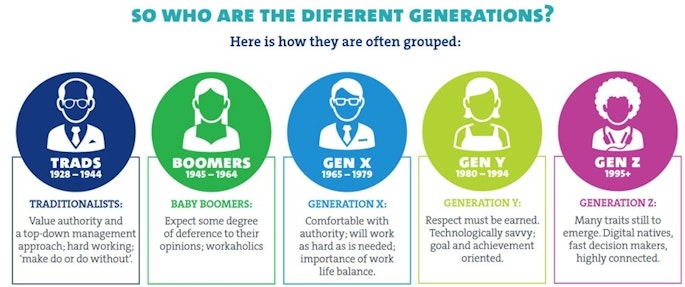Enter the Millennials
Consider the generation you were born in, the years can change depending on your source, yet here is a quick reference if you are unsure where society bands you:

The generation that is currently occupying Year 12 is the tail end of Generation Y; the millennials, they are also blurred with the start of Generation Z or aptly named iGeneration. To date most of those born at the turn of the 21st century, hence the name millennials, have been in school, university or in the infancy of their chosen careers. Yet now, the world is starting to grapple with the generation of millennials moving deeper into their chosen careers.
As educators, we are now accustomed to hearing the well worn rhetoric of, 'we do not know what type of world we are preparing our students for', yet perhaps it is more clearly defined than we may first think.
As a generation 'Millennials' are the most entrepreneurial for some time. More than 275,000 new business start up each year, a significant proportion by those under 36 years of age.' (Ruthven, 2017).
When considering that as a College we now have a number of students in the Senior School who have engaged in e-commerce and established their own businesses through a range of mediums that were unavailable to a previous generation it does leave us pondering how best to educate a generation born into the borderless world of the internet.
In a report released by the Regional Australia Institute in November of 2016 a toolkit was provided for parents and students to consider how to set kids up for success in the 2030 job market. This toolkit can be found here: https://www.thefutureofwork.net.au/.
This resource provides some excellent reading for parents who are looking to support what we are actively working on as a College through the International Baccalaureate Approaches to Learning. By explicitly teaching skills accompanied with the content of the Australian Curriculum, we aim to support the next generation of the Australian workforce. More information about the way we do this as a College can be found here: https://home.scotch.wa.edu.au/teachingandlearning/.
Considering we have students in our Early Learning Centre who were born in 2013, we had best continue to consider how we reimage education to suit the needs of those students now and in the future.
Works Cited
Ruthven, P. (2017, August). Here come the Millennials. Company Director, 33(07), 26-237.
Mr Peter Allen
Director of Teaching and Learning
Curtin University Expands Credit Arrangements
In March of this year the College was delighted to have the International Baccalaureate Diploma programme receive credits for first year university courses as approved by the Deputy Vice Chancellor - Academic, Professor Jill Downie. This arrangement allows IB Diploma students to apply for credit on a case by case basis if they achieve a final grade of six or higher in their Diploma course.
In March, Credit for Recognised Learning was granted for the following units:
|
Scotch College International Baccalaureate Diploma Programme |
CRL Credit Points |
Special Conditions/Further Information |
|
Physics (HL) |
25 credits |
Specified credit for PHYS1005 Physics 1 |
|
Chemistry (HL) |
25 credits |
Specified credit for CHEM1000 Principles and Processes in Chemistry |
|
Economics |
25 credits |
Exemption for ECON1000 Introductory Economics |
|
Economics and Business Management |
50 credits |
Exemption for ECON1000 Introductory Economics (25 credits) and one unspecified elective (25 credits) |
|
Mathematics (HL) |
25 credits |
Specified credit for MATH1015 Linear Algebra |
|
Psychology (HL) |
25 credits |
Specified credit for PSYC1000 Introduction to Psychology |
We are equally delighted that our IB Diploma students are now able to apply for credits in the following subjects:
|
Scotch College International Baccalaureate Diploma Programme |
CRL Credit Points |
Curtin Units |
|
History |
50 credits |
Specified credits for HIST1000 Legacies of Empire (25 credits - Semester 1) and INTR1001 Australia and Asia Transformed (25 credits - Semester 2) |
|
Global Politics |
25 credits |
Specified credit for INTR2000 International Relations Theory and Practice |
|
Information Technology in a Global Society |
25 credits |
Specified credit for NET1001 Web Communications (also recommend to complete How Media Got Social MOOC before starting higher level Internet Communications units) |
|
Language and Literature |
25 credits |
Specified credit for CWRI1003 Narrating Selves - contingent on independent assessor deeming Language and Literature course to be required AQF level for entry to Curtin program and SL is adequate |
|
Geography |
25 credits |
Specified credit for GEOG1000 Human Geography |
|
Biology |
25 credits |
Specified credit for BCCB1000 Cell Biology |
|
Design Technology |
25 credits |
Specified credit for GRDE1016 Digital Design Process offered for Animation and Game Design Major and Digital Design Major. All other single majors receive 25 credits for elective units |
|
Sports, Exercise and Health Science (HL) |
25 credits |
Specified credit for HUMB1000 Human Structure and Function - contingent on high performing IB students who complete Biology (HL) and Sports, Exercise and Health Science (HL) |
We believe this is a testament to the rigorous nature of the IB Diploma programme and the value which universities, locally, interstate and internationally are placing on students who have completed the Diploma programme.
Information regarding IB Diploma admission can be found here; this page is soon to be updated with the new arrangements:
The arrangements for the University of Queensland can be found at this link.
The arrangements for Stanford University can be found at this link.